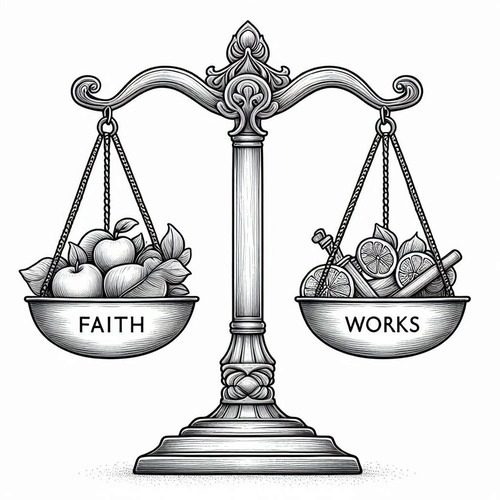Salvation: By Faith Or Works? Or Both?
Salvation: By faith or works? Or both? One of the most fundamental questions in Christian theology is this: What is required for salvation? Is it faith alone in Jesus Christ that saves, or do works (good deeds) also play a necessary role? This has been a source of considerable debate, even division among Christians. Let’s dive in, and see if we can find clarity in the Scriptures on this pivotal issue.
Faith Alone?
On one side, we have assertions such as Ephesians 2:8-9—”For it is by grace you have been saved, through faith—and this is not from yourselves, it is the gift of God—not by works, so that no one can boast.” This seems to clearly state salvation is by grace alone through faith alone, and not by works.
Additionally, in Romans 3:28 Paul writes, “For we maintain that a person is justified by faith apart from the works of the law.” And in Galatians 2:16 he says, “A person is not justified by the works of the law, but by faith in Jesus Christ.” Over and over, Paul appears to be dismissing works or obedience to the Law as requirements for justification before God.
Or is it Faith + Works?
Salvation: By faith or Works? Or both? Paul states in Romans 2:6-8: “God will repay each person according to what they have done. To those who by persistence in doing good seek glory, honour, and immortality, He will give eternal life. But for those who are self-seeking and who reject the truth and follow evil, there will be wrath and anger.” Here good works appear to be rewarded with eternal life.
Jesus Himself taught obedience to His words and doing the will of the Father is critical. “Not everyone who says to me, ‘Lord, Lord,’ will enter the kingdom of heaven, but only the one who does the will of my Father who is in heaven” (Matthew 7:21). And in John 14:15 He states plainly: “If you love me, keep my commands.”
Most perplexingly, James 2:24 declares: “You see that a person is justified by works and not by faith alone.” James provides the example of Abraham being “justified by works” when he offered up Isaac on the altar. This seems to directly contradict Paul’s statements about justification being by faith apart from works! READ MORE: CAN GOOD DEEDS HELP US GET TO HEAVEN?
Resolving the Tension
The key is found in understanding the different aspects of salvation being addressed. There is the legal declaration of justification—we’re made right before God by grace through faith in Christ’s work on the cross. No amount of human works could ever accomplish this judicial pardon for sin. Faith in Jesus is the only way to be justified, apart from deeds of the law.
However, justification is not the end of salvation, but the beginning. God’s desire is not only to declare His people righteous, but to make them righteous—to transfer them from the kingdom of darkness into the kingdom of light through spiritual rebirth and transformation by the Spirit. This sanctifying aspect of salvation is also a work of grace, accomplished through the Holy Spirit’s activity within believers.
James addresses the outward evidence of this inward transformation. True saving faith will always result in a changed life, but it’s crucial to understand that even our obedience and good works are the result of the Spirit’s work in us, not our own efforts.
Judgement and Rewards
While good works play no role in justification or sanctification as a means of earning God’s favor, they do relate to future rewards and blessings both in this age and the age to come (2 Corinthians 5:10). All who are justified by faith will inherit eternal life, but there are varying levels of reward in the eternal kingdom according to our faithfulness in allowing the Holy Spirit to work through us.
The Crucial Role of Obedience
Obedience remains important, not as a means of earning salvation or sanctification, but as a natural outworking of the Spirit’s presence in our lives. Jesus emphasized that even seemingly small acts of obedience hold great significance in His eyes:
“And if anyone gives even a cup of cold water to one of these little ones who is my disciple, truly I tell you, that person will certainly not lose their reward.” (Matthew 10:42)
While we are not saved by obedience, obedience is the lifestyle that naturally flows from one who is genuinely saved by grace through faith and is being sanctified by the Holy Spirit.
The Balanced View
Salvation: By faith or Works? Or both? Ultimately, we must be careful never to mistake the role of works—as crucial as they are, good works can never justify us before God or sanctify us. If works alone could make us righteous, Christ’s sacrifice would have been unnecessary. We are justified by grace alone through faith alone, lest any human being should boast (Ephesians 2:8-9).
Similarly, our sanctification is also a work of grace through the Holy Spirit. While obedience and good works are important in the Christian life, they are the fruit of the Spirit’s work in us, not the cause of our sanctification. As Paul reminds us in Galatians 3:3, “Are you so foolish? Having begun by the Spirit, are you now being perfected by the flesh?”
Salvation: By faith or Works? Or both? We must understand salvation is multi-faceted: both our justification and sanctification are by grace through faith. Good works are the evidence of the Spirit’s transforming work in our lives, not the means by which we earn or maintain our salvation. May we embrace this truth as we seek to walk faithfully with our Lord, relying on His grace and the power of the Holy Spirit for our growth in holiness.
Related Reads:
- Can Good Deeds Help Us Get to Heaven?
- The Cross: Answers to the Most-Searched Questions
- Defending Penal Substitutionary Atonement
Editor's Pick

Should We Stop Using Male Pronouns for God? Why Do We Say No?
A friend of ours arrived eagerly at his first theology class in seminary. But he quickly discovered something troubling: the [...]

Did Old Testament Law Force Women to Marry their Rapists?
**Editor’s Note: This post is part of our series, ‘Satan’s Lies: Common Deceptions in the Church Today’… Viral misinformation abounds [...]

From Danvers To Nashville: Two Statements, One Biblical Vision
30 years separate the Danvers Statement on Biblical Manhood and Womanhood (1987) and the Nashville Statement on Human Sexuality (2017). [...]

The Nashville Statement: Why Affirm It Despite Media Backlash?
WHY DO REFORMED CHRISTIANS STAND BY THIS STATEMENT ON MARRIAGE AND GENDER? When the Nashville Statement was released in 2017, [...]

Who Is Belial? Solving The 2 Corinthians 6:15 Mystery
Belial: This name from the pages of Scripture chills the soul. Who is this mysterious figure Paul invokes in 2 [...]

Celibacy Or Castration: What Jesus Really Means in Matthew 19:12
One of Scripture's most shocking misinterpretations led theologian Origen to castrate himself in the third century. His tragic mistake? Taking [...]

Philippians 4:13: Did Paul Really Mean We Can Do ALL Things?
"I can do all things through Christ who strengthens me." It's on gym walls, graduation cards, and motivational posters everywhere. [...]

The Ordinary Means of Grace: Why Are They Indispensable?
ORDINARY MEANS FOR EXTRAORDINARY TRANSFORMATION What if God's most powerful work in believers' lives happens through the most ordinary activities? [...]

Is the Bible God’s Word? Or Does It Only Contain God’s Word?
The authority of Scripture stands at the crossroads of modern Christianity. While some argue the Bible merely contains God’s Word [...]

Will We Remember This Life in Heaven? What Isaiah 65:17 Means
"Will I remember my spouse in heaven? My children? Will the joy we shared on earth matter in eternity?" These [...]
SUPPORT US:
Feel the Holy Spirit's gentle nudge to partner with us?
Donate Online:
Account Name: TRUTHS TO DIE FOR FOUNDATION
Account Number: 10243565459
Bank IFSC: IDFB0043391
Bank Name: IDFC FIRST BANK






